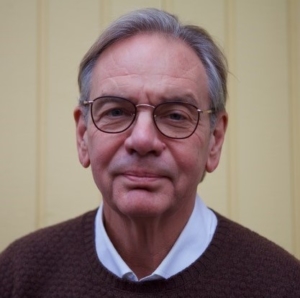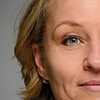Håkan Matson – Writer and ghostwriter, moderator, consultant, hockey expert, Honorary President of the jury “Car of the year”
“The one who is not fooled by success is not broken by adversity either.”
Having been a journalist for the most part of his career, Håkan Matson has conducted his own fair share of interviews himself. This time, he is on the opposite side of the microphone (admittedly not the first time neither), thinking out loud about his career path, his personal strategies and motivation and a lot of formative encounters on the way.
Very consciously not calling himself a journalist since he retired – ‘out of respect for the profession’, as he says -, Håkan is still very much doing what he is doing with the same qualities and values that distinguished him as an active journalist: honesty, integrity, curiosity and creativity.
Did you always want to become an automotive journalist?
When I was 3 years old, I would sit by the window and watch the cars drive by, being able to name every single brand, without fault. Already then, I had a good eye for design. And still, a career in this direction was not at all planned. My first love was with mathematics, and I contemplated a university degree in maths. Yet without a clear vision of the practical feasibility of such studies, I dismissed the thought.
My father was a photographer for a newspaper, and when I was 15/16 years old, I almost started to compete with him, trying to take better pictures – which then would be offered to the newspaper as well. I can still recall the pride when one of my pictures had been chosen over his and got published.
I began to work as a photographer, then started to write – and eventually was accepted to the University for Journalism in Gothenburg. Whilst in my beginnings as a journalist I wrote about everything and anything, I later leant more and more towards the automotive industry and was happiest when I could combine articles about the product with the economy and business side.
Which person influenced you most in your life?
More than anyone, it was the readers who influenced me the most. It was also them who challenged me a great deal. I saw it as my job to defend the reader’s spot.
Also, if I interviewed someone and they felt criticised in an article, they would immediately react. Most of the time, because they felt attacked as a person, even though my stories never criticised people, only circumstances, strategies, decisions. However, I was always prepared to meet the people who felt criticised the next day and discuss the matter at eye-level.
In one of your speeches – before handing over the trophy for “Car of the Year”, you once said: ‘Being first is always very special.’ When did you have the feeling of being ‘first’ in your life?
I am not sure I ever had this feeling. Probably because it is more important for me to be proud than to be first. And pride I felt when I was elected President of the jury “Car of the Year”. I had never considered the role and had been offered the position. And even though my first reaction was ‘Absolutely not!’, I jumped at the opportunity – like many other times in my life.
Having been very shy in school, things like presenting and later handling conferences did not come naturally to me. When I was asked to ghost-write a book for the Norwegian sports psychologist and professor of performance psychology Willi Railo – during his career also consultant for football managers -, I again took the opportunity, not knowing how much this work would teach me about mental strength, motivation and self-assuredness – all characteristics that I then used in presentation situations to not only own the space, yet literally feeling empowered, enjoying the moment – and to grow.
What milestones have shaped you in your life?
Certainly my time as a correspondent for ‘Expressen’ in New York. I happened to live there when the 9/11 terror attacks occurred, and I was just a block away from Ground Zero on the day. Like a lot of people – in my case out of personal curiosity and concern as well as professional interest as a journalist -, I walked towards the towers to see what was going on, only to realise shortly after that one of the towers was about to collapse and that I had to run for my life. Despite all the dust, the smoke and the general chaos, I managed to find shelter in an office building where I stayed for a while, then started to walk back towards the scene. That was when the second tower collapsed, and I had to run again…
That time very much shaped the way I was writing articles. I did a lot of good articles back then. Stories that would allow me to be emotional, papers that would require dealing with other people’s emotions. And emotions there were a lot in the aftermaths of the attacks. Not one day without a funeral of a fireman, numerous concerts to honour the victims and to regain strength as a nation and a community – long before the Americans started to ask questions as to who was responsible, they had to deal with the emotional part of the events.
The happenings very naturally brought up an interest to get close to people, even to their homes, to tell their stories. I would spend weeks looking for people I had heard of escaping the towers to give faces to a seemingly anonymous tragedy. Like this heavily pregnant woman who walked down 34 floors in the dusty staircase – and gave birth to her daughter the next day. Or the bereaved of a victim in the Pentagon attacks whose DNA has never been found. It was a great deal earning these people’s trust. One moment, they would want to cancel the interview – and then spend the whole day telling me about their side of the story, their grief, their complete and utter incomprehension.
I also wanted to show the other side, the Muslim community, those who were collectively accused to be culprits without having anything to do with the attacks, just wanting to live their lives.
Events like this make you appreciate life more. You get a sense about the fact that life is not eternal and can be finished in the blink of an eye. Who would have ever envisioned that 2 planes would crash into the Twin Towers, completely erasing them? It was simply beyond imagination.
Would you say that this was the most difficult time in your life?
Surprisingly, this chapter of my life was actually not the most traumatic one. It taught me a lot about life and its finiteness and was very emotional altogether. And yet there were other moments and circumstances in my life – very personal ones -, that challenged me even more; events on a strictly personal and private level.
What makes you as a Swede Swedish?
I personally don’t look at myself as being very Swedish. Of course, typical characteristics like gender equality or social balance have always been instilled in me. During my professional activity – especially as President of an international jury -, I had to work with a large number of different cultures. So I quickly had to learn to convert my Swedish directness into more diplomacy.
When you think back of all the countries you have visited, traversed or lived in – is there a culture that you have been touched by particularly?
I am intrigued by Japan, a culture that I can identify with very much. I like everything about the Japanese civilisation: the people, the mentality, the food. I especially am captivated by their humbleness and philosophical approach to all things. When I was dealing professionally with Japan, I was impressed by their long-term planning of projects, their care and outstanding commitment to top quality.
What advice would you give to younger people with your life-long experience?
I would tell them: Be true to yourself, have integrity, be honest. Make the most of your gifts to make the most of your potential. No matter – and I mean, NO matter – what your gifts and potential are. It is not about titles and ranks, it is all about fulfilment. I actually did tell this to my two sons – and the seed seems to have fallen on fertile ground…
(published 17th May 2019)


